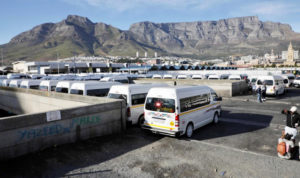Streaming at the speed of a taxi
Author: Thabiso Mochiko

CAPTIVE EARS: Several companies, including Vodacom and Sebenza, are installing Wi-Fi in taxis to gain access to millions of commuters.
Picture: SUNDAY TIMES/ ESA ALEXANDER
Companies are lining up to install free Wi-Fi in taxis and buses for a slice of a captive market
Competition is heating up in the public transport space as companies jostle to install WiFi routers in buses and taxis to access millions of commuters – a captive market for advertisers.
This week Vodacom and vehicle tracking company Netstar, a subsidiary of Altron, announced their partnership to create WiTaxi, while digital content company Sebenza, partly owned by former government spokesperson Mayihlome Tshwete, recently initiated a rollout with plans to install devices in 10,000 taxis this year.
Over the years, free WiFi has been installed in some public spaces by the government and the private sector to help those who cannot afford to buy data bundles.
Tshwete said in an interview with Business Times this week that Sebenza is an “online ecosystem” that keeps commuters entertained with its own content, including music. Sebenza promotes its in-transit Wi-Fi as a way of making information freely available to commuters and potentially enhancing productivity.
Sebenza is available in over 2,000 taxis across the country, reaching 600,000 sessions* per month.
Netstar Group MD Grant Fraser noted in a statement that the taxi industry “is responsible for more than 60% of daily commutes, making it an integral part of the country’s transport sector and a significant economic player”.
“We believe that the connected commute is going to be a game changer for South African taxi passengers, drivers and even operators,” he said.
Netstar’s tracking telematics devices installed in 3,200 Toyota minibus taxis can double up as Wi-Fi routers. There is potential to reach 48,000 taxis with WiTaxi technology.
To access the free Wi-Fi, commuters are required to take part in surveys or watch short adverts.
“This is an untapped and exciting opportunity for SMMEs [small, medium and micro enterprises] to generate maximum activity by connecting with approximately 15-million people,” WiTaxi MD Brian Mdluli said in a statement.
In Sebenza vehicles, passengers will earn “Sebenza bucks” that can be used to access the internet. Al the parties involved in providing the free Wi-Fi will make money from advertising.
Tshwete said the company will add more video content tailored for commuters and the time they spend travelling. Sebenza will also have a jobs portal, financial literacy content and podcasts.
“We will have content that is relevant, entertaining and educational so that people don’t want to leave the Sebenza platform once connected,” he said.
Sebenza has a TV production studio where it plans to produce content but will also partner with others to do so.
“We don’t want to be known as a company that gives free Wi-Fi, but as a preferred platform that provides consumers with relevant and education content [and] also connects brands with millions of commuters,” he said.
Robyn Nel, brand manager at Sebenza, said in a statement: “With integrated location-based mobile advertising and products, commuters are receiving content relevant to where they are at that moment, making it easier to connect to experiences and brands.”
Tshwete said Sebenza technology will benefit the taxi industry by providing data analytics of commuters.
This article originally appeared on Times Live and Business Live
Print Publications: The Sunday Times, Daily Dispatch and The Sunday Times Second Edition – Business

